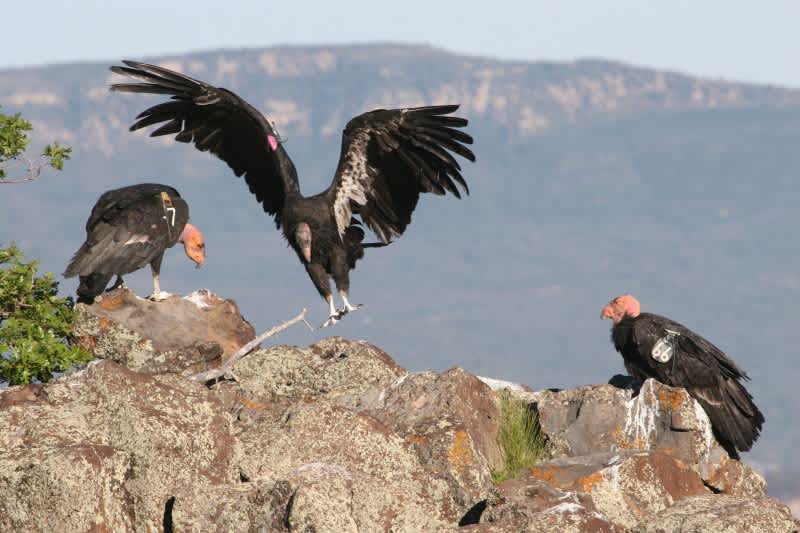California Condors Get Help from Utah Hunters
Utah Division of Wildlife Resources 10.17.13

A non-lead ammunition program has been greatly expanded in southwestern Utah this year.
The program should reduce the number of California condors that get lead poisoning after eating the remains of big game animals.
In addition to knowing they’ve helped the birds, hunters who use non-lead ammunition on the Zion hunting unit will be eligible for prizes. Hunters who use lead ammunition on the unit will also be eligible if they remove from the field the remains (also known as gut piles) of the animals they take.
The prizes hunters can win include a 2014 Honda Rancher 400 ATV or one of five hunting rifles.
Utah’s non-lead program is patterned after a program the Arizona Game and Fish Department started in 2005. Since 2007, AZGFD says 80 to 90 percent of those who hunt in areas where condors live in Arizona have taken voluntary actions to reduce the amount of lead condors are exposed to. Those actions include using non-lead bullets or hauling gut piles out of the field.
“A similar response by Utah hunters may be all that’s needed to ensure this unique bird can survive in the wild once again,” says Keith Day, wildlife biologist with the Utah Division of Wildlife Resources.
Arizona and Utah’s approach to helping California condors is different than the approach in California. In that state, big game hunters cannot use lead ammunition in areas where condors live. Recently, California Gov. Jerry Brown signed into effect a law that will restrict the use of lead ammunition even more. Starting in 2019, all hunters, not just big game hunters, must use non-lead ammunition while hunting anywhere in California.
Greg Sheehan, director of the Utah Division of Wildlife Resources, doesn’t believe a ban on lead ammunition is necessary in Utah. “We’re confident hunters will step up to protect condors in the state,” he says. “We don’t have any intentions of proposing or supporting legislation that would ban the use of lead ammunition in Utah.”
Sheehan says in 2012, 50 percent of those who hunted in the Zion unit used non-lead ammunition. “Our sportsmen are readily adopting the program,” he says. “They’re demonstrating again why hunters and anglers are the best stewards of wildlife North America has ever known.”
Sheehan says the Utah DWR worked closely with The Peregrine Fund, the U.S. Fish and Wildlife Service, the U.S. Forest Service and other organizations to develop what he believes will be a successful strategy to reduce the amount of lead condors are exposed to in Utah. Here’s how Utah’s program works:
- In August, the Utah DWR mailed coupons to the 2,123 hunters who drew a rifle permit to hunt deer, bighorn sheep or antlerless elk on the Zion unit. Hunters can use the coupon to obtain a free box of non-lead ammunition.
- All rifle hunters on the Zion unit can be entered in the prize drawing by visiting one of five check stations, or one of two Utah DWR offices, and providing proof that they’re using non-lead ammunition. The non-lead bullets must match the rifle they’re using.
- Even those who hunt with lead ammunition on the Zion unit are eligible for the prize drawing. To be entered in the drawing, they must bring the remains of the animal they took to any of the seven locations. (Bins that remains can be disposed in will be available at each location.)
- Deer hunters on the Zion unit aren’t the only ones who can qualify for the drawing. Those who hunt elk or bighorn sheep with a rifle on the Zion unit can also qualify by meeting the same requirements deer hunters must meet.
For more information about the prize drawing, call the DWR’s Cedar City office at 435-865-6100.
More information about California condors in Utah is available at www.wildlife.utah.gov/condors and www.peregrinefund.org/condor-cliffs.

